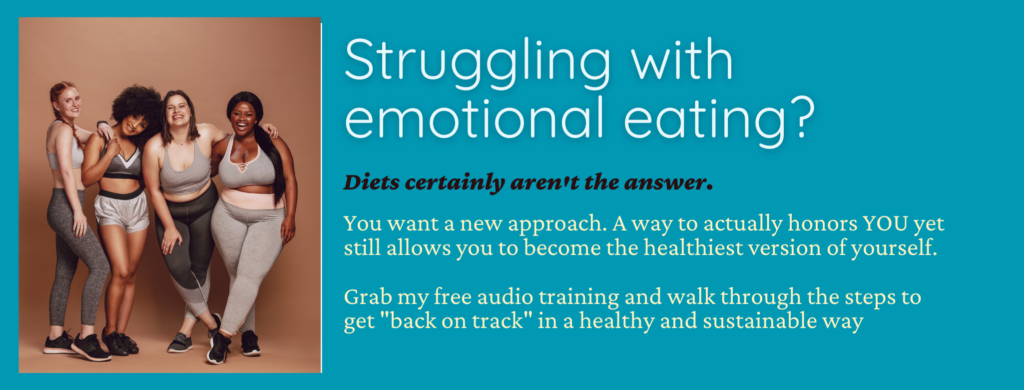Podcast: Play in new window | Download
Subscribe to The Innovative Therapist Podcast! Apple Podcasts | Spotify | RSS | More
Episode 2. This episode is all about why dieting does not work and the many ways in which getting caught in the dieting cycle keeps us distracted from the things that matter.
Very often, it keeps us from the good we want to do in the world.
Topics Covered
- We talk about how dieting causes stress and very often preoccupation with food.
- Although many people assume that they are “failing the diet”, many of their perceived “failures” (like binge eating) are 100% caused by dieting itself. But yet, we blame ourselves and start another diet or “eating plan” and keep the cycle going.
- Giving up dieting does not mean giving up any pursuit of your health. In fact, quite the opposite is usually true. Giving up dieting lets us see more clearly what matters and what we need to do logistically to improve our health, if that’s what we choose. We just get to do it without all the diet-binge-shame BS.
- I talk about the Minnesota Starvation Experiment and how 36 men that were “starved” (put on a 1570 per day diet and lost 25% of their weight) became obsessed and preoccupied with food, and lost all interest in other things like hobbies, sex, etc (Keys et al., 1950). I discuss some of what this can teach us about the biological impact of dieting.
- I talk about the research study looking at calorie restriction without food monitoring (with pre-packaged meals) and how that increased cortisol, suggesting that calorie restriction itself inherently causes stress (Tomiyama et al., 2011) which makes us more prone to weight gain.
Learn More About How Dieting Fails Us
Check out my blog post for a comprehensive overview of the ways diet fails us (called “How Dieting Fails Us: A Comprehensive Guide“).
Self Control is a Limited Resource
We only get so much “willpower” or self control in a given day, as it turns out. People with sustainable habits they feel good about are not fighting tooth and nail every single day to keep them up.
I wrote previously about how to use this knowledge in our favor and learn to make habit changes that can actually last over the long haul. Check out the post here: NEWSFLASH: No One Has Enough Willpower for Dieting.
Dieting Messes with our Biology
It isn’t just in your head. Our body fights hard against our dieting attempts, and much of the weight regain people experience is due to this. Yet they blame themselves. There is solid research on the biological changes that occur after weight loss, and it does not bode well for the diet industry.
If this does not convince you that diets are failing us, and not the other way around, I don’t know what will. Check it out here: How Dieting Messes with Our Biology.
Dieting Erodes the Very Things that Are Essential for Long-Term Change
We know from decades of research on motivation that we all need three psychological needs met to promote behavior change over the long-term: competence, relatedness, and autonomy.
Without these needs being met, sustained change in any important area of your life is unlikely. Dieting usually reduced all three, yet we keep dieting. More on this here.
Defining the “Diet Mentality”
- An attempt to control your weight as the ultimate goal.
- The mindsets involved in a weight loss attempt, that comes from a place of external “should-based motivation”.
- Often coming from a place of “I’m not ok” as I am now. Typically this is the message we get from the diet and weight loss industry. “I’m not ok, but I could feel SO great and confident about myself if I just lost weight!”
- It comes along with an assumption that whatever program or plan you are going on knows what you “should” eat.
- It is also based on the assumption that if you do XYZ steps “right” you will lose weight. Dieting attempts to give us a feeling of control, at least in the short-term.
The “Dieting Overlay” Covers Up the Other Stuff
- This illusion of control is incredibly alluring, however, it distracts us from other important things
- Often we are so caught up in this ineffective cycle we waste a lot of time and resources that could be used on other things
- I think of it as a sheer black veil covering things in your life, both painful things as well as joy and other positive emotions
The Logistics of Healthy Habits Become More Clear
Unless you have a personal chef, you will likely have to do some work to figure out how healthy habits fit into your life. Once we remove the dieting overlay (the sheer black veil) we can see things more clearly and make adjustments that fit us and our preferences and goals.
Struggling with feeling “off track” or out of control with your habits but want an alternative to dieting? Grab my free audio download to walk you through the “how” of tuning in to your body and gaining control.
So Dieting Does not Work… Now What?
- Take a step back and look at how dieting is impacting your life. What is dieting holding you back from? What would you do differently if you weren’t concerned about your weight and/or appearance?
- Just notice when and where the diet mentality comes up for you. You don’t have to change it yet, just notice. Notice how it makes you feel physically and emotionally. Just. Pay. Attention.
- Remember that giving up dieting does not have to mean not eating well or not eating in line with your goals. It does mean giving up the need to control your weight and choosing actions that you would do regardless of whether or not it influenced the scale. It does not mean not focusing on making changes that you want to make in your life with regards to eating, movement, maybe drinking less alcohol, etc. It just means you begin doing so from a place of taking great care of yourself and your body, versus external shoulds. For many, this takes some time and practice, so be patient with yourself.
Need Some Extra Help with the How?
If you are thinking, this sounds good Shawn but how do you actually implement this mindset shift?
I made this free audio just for that reason. It walks you through the steps to follow if you are feeling out of control with eating or noticing an urge to restrict, what the heck to do instead. I walk you through the steps of actually tuning in to your body and then making a plan for yourself from a place of self-respect.

Want More?
Click play to listen to this episode here or wherever you listen to podcasts. To make sure you never miss a new episode, go here to make sure you are part of my Insider’s Community where you will get updates about new blog posts and podcast episodes and first dibs on new resources and programs!
Follow Me on Instagram * Facebook * Pinterest
References
Keys, A., Brožek, J., Henschel, A., Mickelsen, O., & Taylor, H. L. (1950). The biology of human starvation. (2 Vols.). Univ. of Minnesota Press.
Tomiyama, J., Mann, T., Vinas, D., Hunger, J., Dejager, J., & Taylor, S. (2011). Low Calorie Dieting Increases Cortisol. Psychosomatic Medicine, 72, 357-364.

I really resonated with this episode! The question of “what would you do differently if you weren’t concerned with your weight and appearance” made me realize how often I think about my own diet and the way that I look on a daily basis. It made me realize how I need to shift my thoughts and get away from this diet mentality that so many of us are in. Thank you Dr. Hondorp for asking this question!
Thanks so much for your comment, Tara! Yes, it’s a continual process for many of us. Glad that question was helpful. 🙂
As someone who once fell prey to unhealthy fad diets, the part where you defined “diet mentality” truly resonated with me. It is really easy for women to identify weight or caloric intake control as the ultimate goal of their weight loss journey, and it is a sign of lingering trauma enforced by our society’s diet culture. As enticing as “losing 10 pounds in 1 week using this method” may sound, it is important for us to understand that patience with one’s dieting journey will be more effective and healthy in the long run. Thank you so much for discussing this and for offering valuable tips!
I love that this podcast always tries to give the real, unbiased truth by using evidence based science. The “sheer black veil” is a great metaphor that sheds a lot of light on the internal struggle of food obsession. Dr. Hondorp has a great way of communicating the feeling of lack of control and trust in yourself, and how to make positive and sustainable change! I am learning so much about myself and where I stand in terms of the weight loss and diet culture industries.
Thanks so much for your comment and insights, Caitlyn!! Appreciate you 🙂
I loved this episode! It’s appalling that we are blamed for not sticking with diets when diets don’t work in the first place. People are shamed for not being able to keep up with a flawed system. Thanks for spreading this valuable message!
Thanks so much for reading and for your comment, Julia! A flawed system for sure!